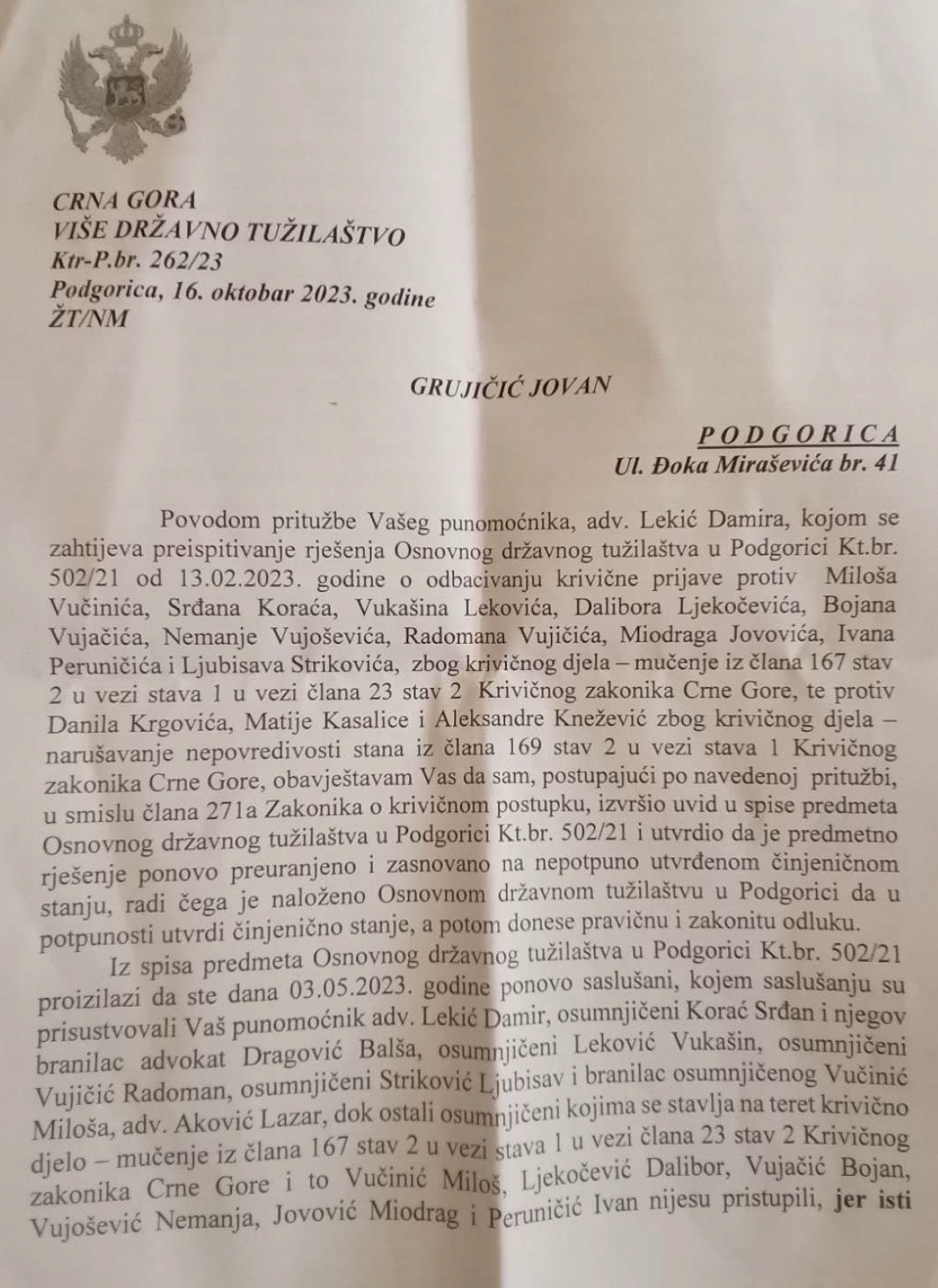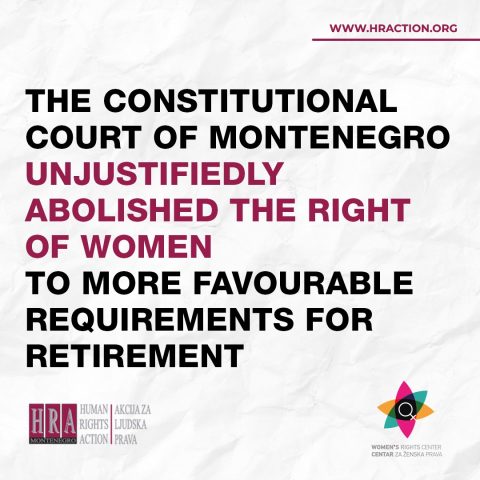
HRA APPEAL: URGENTLY RECUSE PROSECUTOR MAJA KNEŽEVIĆ, WHOSE DECISION DISMISSING THE CRIMINAL CHARGES OF POLICE TORTURE HAS BEEN REVERSED FOUR TIMES
23/10/2023
REVIEW OF THE EUROPEAN COMMISSION’S REPORT ON MONTENEGRO 2023 – SUBJECT: WAR CRIMES
08/11/2023THE CONSTITUTIONAL COURT OF MONTENEGRO UNJUSTIFIEDLY ABOLISHED THE RIGHT OF WOMEN TO MORE FAVOURABLE REQUIREMENTS FOR RETIREMENT

The Human Rights Action and the Centre for Women’s Rights are protesting the decision of the Constitutional Court of Montenegro to abolish the right of women from Article 17, paragraph 1 of the Law on Pension and Disability Insurance (LPDI) to retire two years earlier than men (at the age of 64 and after 15 of employment), treating it as discrimination.
We believe that it was not necessary to make such a decision. The problem of discriminatory forcing of female judges and state prosecutors to leave their offices at the age of 64 could have been solved in another way, by adequately supplementing the law. Not all women who want to retire at the age of 64, or men – who now must have 40 years of employment in order to be able to retire – had to be harmed by this. And there was no need to bring chaos, whose resolution remains uncertain, into the legal system.
The reasoning of the Constitutional Court does not correspond with Article 8 paragraph 2 of the Constitution of Montenegro, which allows more favourable requirements for women until the achievement of the goal of gender equality (the so-called positive discrimination). The European standards, which are binding on Montenegro, did not force the Constitutional Court to make such a decision.
The European Court of Human Rights expressly believes that setting more favourable requirements for retirement for women does not constitute discrimination, and there are several European countries that still provide for such a right – Austria, Bulgaria, Lithuania, Poland, Romania, Switzerland and Turkey. It is true that the standards prescribed by the directives of the European Union require the equalisation of requirements for retirement based on gender. However, the EU is asking for a gradual equalisation – not a sudden one – until other conditions are created to enable the equal position of women, so that it does not have to be done by way of pension issues.
The Constitutional Court of Montenegro seems to be adjudicating in another country, where positive discrimination against women has become unnecessary. Unfortunately, Montenegro is far from the constitutionally guaranteed gender equality, as continuously shown also by the reports of international organisations. Although patriarchal habits are slowly changing, women due to retire have, as a rule, worked two full-time jobs – one at work and one at home, and thus deserve the right to retire early if they wish to do so.
We conclude that, even after three years of waiting, the majority of judges in the Constitutional Court made this decision without sufficiently considering it, and without insight into all its possible massively negative consequences (more details to follow), as it was only after the first negative reactions of the public following the first announcement of the decision, they decided to add paragraph 2 to it and oblige the Government of Montenegro to submit to the Assembly (obviously without a public debate!), within one month from the publication of the decision in the Official Gazette, a new draft provision/provisions that would fill the legal gap. However, much like the judges of the Constitutional Court Snežana Armenko and Momirka Tešić, who said the same in their joint dissenting opinion, we warn that the negative consequences caused by the legal gap will occur immediately after the publication of the decision in the Official Gazette because the Constitutional Court did not prevent them by ordering that the decision be published only after the legal gap has been remedied, in accordance with Article 65 of the Law on the Constitutional Court.
Bearing in mind that the issued decision of the Constitutional Court can no longer be corrected, and that the only thing that can be done is legislative activity under the conditions imposed by that very decision, we appeal to the legislator to make it possible for everyone who so chooses to retire at the age of 64, and with 15 years of employment, with the specification that this possibility also applies to judges and prosecutors, instead of being a mandatory condition for termination of office.
* * *
Why do we believe that the Constitutional Court did not act in accordance with the Constitution of Montenegro and the binding European standards?
In its Article 8 – Prohibition of Discrimination, the Constitution of Montenegro expressly allows regulations that are “aimed at creating conditions for the exercise of … gender … equality and protection of persons who are in an unequal position on any grounds”. Therefore, neither this Article, nor Articles 17 and 18 of the Constitution of Montenegro to which the Constitutional Court refers, limits the permission to “prevent or compensate for deficiencies in the professional life of women”, as the Constitutional Court interpreted it in its decision.
The Constitutional Court was of the opinion that:
with the contested provision, the legislators violated the constitutional principles on the prohibition of indirect or direct discrimination, on the equality of all before the law, and on gender equality contained in the provisions of Article 8, paragraph 1, Article 17, paragraph 2 and Article 18 of the Constitution of Montenegro, Article 14 of the European Convention and Article 1 of the Protocol no. 12 to the European Convention. The Constitutional Court assessed the quote from the opinion of the Government of Montenegro, which indicated that “prescribing a lower age limit for exercising the right to an old-age pension for women compared to men represents a measure of positive discrimination against women so as to protect women due to their biological functions (primarily motherhood), where insured women decide for themselves whether they will use this right or not”, as irrelevant for the evaluation of the constitutionality of the contested provision from Article 17, paragraph 1 of the Law. Namely, it follows from the provisions of Article 8, paragraphs 1 and 2, Article 17, paragraph 2 and Article 18 of the Constitution, Article 157, paragraph 4 of the TFEU, the recital no. 22 of the Directive 2006/54/EC35 of the European Parliament and the Council of the European Union and the practice of the European Court of Justice, that, in order for the establishment of different requirements for the addressees of the law depending on their gender to have an objective and reasonable justification, which could be considered “positive discrimination”, it must be aimed only at preventing or compensating for deficiencies in the professional life of women, so as to ensure the full equality of men and women in professional life and thereby contribute to women living their working lives on an equal footing with men. On the contrary, in this specific case, the contested provision of Article 17, paragraph 1 of the Law sets different requirements for men and women in terms of the years of life required for the acquisition of the right to old-age pension, based on gender and not the issue that concerns the improvement of the position of women in their professional life, which is why, according to the understanding of the Constitutional Court, it is not possible to apply the principle of “positive discrimination” in relation to the contested provision of Article 17, paragraph 1 of the Law in relation to insured females, in the sense of the provisions from Article 8, paragraph 2 of the Constitution, Article 157, paragraph 4 of the TFEU, recital 22 of the Directive 2006/54/EC of the European Parliament and the Council of the European Union, and the practice of the European Court of Justice.
In its Article 8 – Prohibition of Discrimination, the Constitution of Montenegro stipulates the following: Regulations and introduction of special measures aimed at creating the conditions for the exercise of national, gender and overall equality and protection of persons who are in an unequal position on any grounds shall not be considered discrimination. In Articles 17 and 18, the Constitution of Montenegro stipulates the following: Rights and liberties shall be exercised on the basis of the Constitution and the confirmed international agreements. All shall be deemed equal before the law, regardless of any particularity or personal feature. The state shall guarantee the equality of women and men and shall develop the policy of equal opportunities. Therefore, the Constitution does not mention special measures for exercising gender equality that are limited to “professional lives of women”.
As far as European standards are concerned, the European Court of Human Rights, whose decisions are binding on Montenegro, expressly takes the view that prescribing different retirement ages based on gender does not constitute discrimination (see judgments in Pearson v. the UK and Moraru and Marin v. Romania).
In its decision, the Constitutional Court referred to the judgments of the European Court of Justice that did not consider general regulations that apply to all employees in a country (as they do in Montenegro), but rather regulations that apply to special categories of persons: civil servants, soldiers and judges, whose age limits were prescribed by special laws. It is important to emphasise that in all the aforementioned judgments, the ECJ took the position that states should take care of the equal position of women throughout their working lives, instead of compensating for it through the right to an old-age pension. We fully agree with this position of the ECJ, which is not opposed to measures of positive discrimination against women, which are of a temporary nature and will be abolished when the goal for which they were introduced is achieved – in this case, gender equality in the field of employment. That is why we believe that the decision of the Constitutional Court to equalise men and women in exercising the right to an old-age pension without improved care services and conditions for work and employment of women required by the Directive 2006/54/EC of the European Parliament and the Council of the European Union puts women in an even more unfavourable position than the existing one.
Measures of positive discrimination exist precisely until these inequalities are eliminated, which is why the European Court of Human Rights and the European Union allow them in the form of the Directive on equal treatment in the field of social protection (item 38).
Why is there no justification for abolishing positive discrimination against women in Montenegro?
As continuously indicated by the reports of the United Nations (CEDAW, UPR, CCPR), the European Commission and the Council of Europe, Montenegro is still far from the constitutionally guaranteed gender equality. The latest Gender Equality Index, for 2023, which was measured in Montenegro based on the methodology that is standardised for the EU, is 59.3, while in the EU(27) the average is 68.6. So the situation in Montenegro is worse than the European average by no less than 9.3 index points. In other words, to reach the maximum 100, which would mean that gender equality has been achieved, Montenegro is missing 40.7 points.
With this decision, the Constitutional Court showed a fundamental misunderstanding of gender equality policies and the reasons for the existence of “positive discrimination”, as judges Armenko and Tešić correctly explained in their dissenting opinion. We believe that the Constitutional Court had to take into account the context in which women’s human rights are exercised.
Employed women of Montenegro still bear the greatest part of the burden related to reproductive work (maternity and care of children and family). To make decisions as if we lived in the most equal society on the planet, where women and men equally wash clothes and dishes, clean, cook, raise children, take care of the elderly and care for the sick and dying, is to turn a blind eye to the truth.
The equalisation of the age limit, that is, the required years of employment for women and men will be justified and founded only once a fair distribution of the burden of reproductive work is achieved. Anything that is done before that, or regardless of that, represents a direct attack on the rights of working women. Women in Montenegro still have two full-time jobs, one at the office and another at home. The contribution of women’s unpaid work to the care economy is incomparably greater than that of men. According to the latest research (UNDP 2019), during the three months of the COVID-19 pandemic, women achieved the equivalent of EUR 122.3 million in unpaid care and household work, i.e. 90% more than men did in the same period of time. If we view this data at the level of 12 months, it can be concluded that women achieved the value of monetary equivalent of care and household work in the amount of EUR 489 million, or 10% of GDP, compared to 5% (EUR 254 million) the men achieved in 2019. In addition, unpaid care and household work are chronically omitted from economic policies, although this type of burden negatively affects women’s access to the paid economy, causing large differences in employment, discrimination at work, the level of income and, finally, the amount of pension.
In addition, women still have fewer opportunities for employment, advancement and performing well-paid jobs, and are exposed to discrimination in the workplace twice as much as men. According to available research (Centre for Women’s Rights, 2022), discrimination against women in the field of work is most prevalent in employment procedures, advancement, signing contracts, exercising the right to benefits, working conditions, maternity leave and sexual harassment in the workplace. In such conditions, achieving 40 years of employment is unattainable for most women.
As long as women bear the double burden of both paid and unpaid work, which is at the root of gender discrimination, a more favourable right to old-age pension does not constitute discrimination against men. Once women achieve greater economic independence through paid work, and men take over part of the unpaid work, especially parental leave, we can think about abolishing positive discrimination, i.e. fully equalising the age required for old-age pension..
Possible negative consequences of the Constitutional Court’s decision
Since that the Constitutional Court unfortunately failed to prevent this decision from entering into force before the legal gap created by it has been filled, we would also like to warn about the legal consequences that may occur in the meantime.
Some of the possible legal consequences of the fact that the Constitutional Court of Montenegro abolished the provisions of Article 17, paragraph 1 of the LPDI (“Official Gazette of the Republic of Montenegro” nos. 54/03, 39/04, 79/04 and 47/07, and “Official Gazette of Montenegro” nos. 79/08, 14/10, 78/10, 34/11, 66/12, 38/13, 61/13, 60/14, 10/15, 42/16, 55/16, 80/20, 145/ 21 and 86/22), which reads: The insured person shall acquire the right to an old-age pension when s/he reaches the age of 66 (men) or 64 (women) and at least 15 years of insured employment, are:
- Men, too, no longer have the right to old-age pension at the age of 66 with 15 years of employment.
By abolishing Article17, paragraph 1 of the LPDI in its entirety, the possibility of exercising the right to old-age pension is terminated on this basis for men as well, i.e. men will no longer be able to receive an old-age pension when they reach 66 years of age and 15 years of employment. The provision of Article 17, paragraph 2 of the LPDI, which prescribes that the insured person shall acquire the right to an old-age pension when s/he reaches 40 years of insured employment and 61 years of age, which applies to both men and women, has remained in effect. The decision of the Constitutional Court, which aimed to prevent discrimination against men when exercising the right to old-age pension, actually put men in a position of disadvantage because their required minimum length of employment has now been significantly increased.
At the same time, the abolition of Article 17, paragraph 1 of the LPDI affects men much more than women because the amended Article 17 of the LPDI cannot be applied to women until 2028, due to Article 197đ, paragraph 2 of the LPDI which stipulates that, as an exception from the provisions of article 17, paragraph 1 of this LPDI, an insured female acquires the right to an old-age pension when she reaches 15 years of insured employment, namely:
- In 2020, at 61 years and nine months of age;
- In 2021, at 62 years of age in 2021;
- In 2022, at 62 years and three months of age;
- In 2023, at 62 years and six months of age;
- In 2024, at 62 years and nine months of age;
- In 2025, at 63 years of age;
- In 2026, at 63 years and three months of age;
- In 2027, at 63 years and six months of age;
- In 2028, at 63 years and nine months of age.
- No more individual decisions on exercising the right to an old-age pension
Article 66 of the Law on the Constitutional Court of Montenegro (“Official Gazette of Montenegro” no. 011/15 of 12 March 2015 and no. 055/19 of 27 September 2019) stipulates that the enforcement of final individual acts adopted based on laws, i.e. other regulations and general acts, that is, some of their provisions which were established by the decision of the Constitutional Court to be inconsistent with the Constitution as well as ratified and published international treaties, i.e. with the Constitution and the law, cannot be allowed to be implemented, and that if the implementation has begun, it would be stopped.
In accordance with the above, the Pension and Disability Insurance Fund of Montenegro should issue, ex officio, individual decisions stopping the enforcement of the decision on exercising the right to old-age pension for those who have achieved said right under Article 17, paragraph 1 of the LPDI.
Based on the jurisprudence of the Administrative Court of Montenegro (judgment U. no. 9676/17 of 9 November 2018), the decision terminating a right based on the decision of the Constitutional Court is a declaratory act establishing the termination of a certain right, while the moment of termination is related to the termination of the validity of the regulation, i.e. the date of publication of the Constitutional Court’s decision. Therefore, from the day when the decision is published, the right to an old-age pension for persons who have achieved it based on Article 17, paragraph 1 of the LPDI will be terminated.
- The status of persons who have achieved the right to an old-age pension on this basis remains legally unregulated until further notice
From the date of publication of the decision, due to the termination of the application of Article 17 paragraph 1, the status of insured men who have reached the age of 66 (or 67 if they are civil servants) will remain legally unregulated if they do not have 40 years of employment, when they will achieve the right to a pension based on Article 17, paragraph 2 of the LPDI. Namely, their employment ended by force of law in accordance with the Labour Law (Article 164, paragraph 1, item 1) when they reached the age of 66 and at least 15 years of employment, but without 40 years of employment they will not be able to achieve the right to a pension because the adequate basis for this has been abolished.
- The judicial and prosecutorial offices will keep going regardless of the age of the judges and prosecutors
Article 121 of the Constitution of Montenegro stipulates that a judge’s office is permanent and that a judge’s office ends if s/he so requests, when s/he fulfils the requirements for exercising the right to an old-age pension, and if s/he is sentenced to an unconditional prison sentence. The Law on the State Prosecutor’s Office prescribes the same for prosecutors (Article 103).
By abolishing Article 17, paragraph 1 of the LPDI, the requirement for the retirement of judges and prosecutors, and thus the termination of their offices, is 61 years of age and 40 years of employment (Article 17, paragraph 2). Since the Labour Law of Montenegro does not apply to them and the restrictions on the duration of employment from that Law (termination of employment by force of law at the age of 66 and after 15 years of employment), their offices can keep going regardless of their age until they reach 40 years of employment. Also, bearing in mind Article 197đ of the LPDI, until the end of 2028 this will affect only male judges and prosecutors.
NOTE:
The Human Rights Action has appealed to the Constitutional Court in a timely fashion to prevent the discrimination of female judges and state prosecutors in a different way, and not by abolishing the provision of Article 17 paragraph 1 of the LPDI, which applies to the general population. We also appealed to this Court to urgently decide on the requests of female judges and prosecutors who have ceased to hold office, to have those decisions invalidated. However, the Constitutional Court chose not to prevent discrimination against female judges and prosecutors whose offices have since ended, and to abolish more favourable requirements for retirement for all women in Montenegro while also leaving men in the lurch from the date of publication of this decision in the Official Gazette.







 English
English Montenegrin
Montenegrin